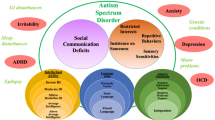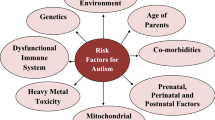Abstract
Objectives
To understand the characteristics of autistic regression and to compare the clinical and developmental profile of children with autism spectrum disorders (ASD) in whom parents report developmental regression with age matched ASD children in whom no regression is reported.
Methods
Participants were 35 (Mean age = 3.57 y, SD = 1.09) children with ASD in whom parents reported developmental regression before age 3 y and a group of age and IQ matched 35 ASD children in whom parents did not report regression. All children were recruited from the outpatient Child Psychology Clinic of the Department of Pediatrics of a tertiary care teaching hospital in North India. Multi-disciplinary evaluations including neurological, diagnostic, cognitive, and behavioral assessments were done. Parents were asked in detail about the age at onset of regression, type of regression, milestones lost, and event, if any, related to the regression. In addition, the Childhood Autism Rating Scale (CARS) was administered to assess symptom severity.
Results
The mean age at regression was 22.43 mo (SD = 6.57) and large majority (66.7%) of the parents reported regression between 12 and 24 mo. Most (75%) of the parents of the regression-autistic group reported regression in the language domain, particularly in the expressive language sector, usually between 18 and 24 mo of age. Regression of language was not an isolated phenomenon and regression in other domains was also reported including social skills (75%), cognition (31.25%). In majority of the cases (75%) the regression reported was slow and subtle. There were no significant differences in the motor, social, self help, and communication functioning between the two groups as measured by the DP II.There were also no significant differences between the two groups on the total CARS score and total number of DSM IV symptoms endorsed. However, the regressed children had significantly (t = 2.36, P = .021) more social deficits as per the DSM IV as compared to the non-regressed children with autism.
Conclusions
Autism with regression is not characterized by a distinctive developmental or symptom profile. Developmental regression may, however, be an early and reliable marker in a significant number of children with autism.


Similar content being viewed by others
References
American Psychiatric Association. Diagnostic and Statistical Manual of Mental Disorders. 4th ed. Washington, DC: American Psychiatric Association; 1994.
Osterling J, Dawson G. Early recognition of children with autism: a study of first birthday home videotapes. J Autism Dev Disord. 1994;24:247–57.
Lord C, Shulman C, DiLavore P. Regression and word loss in autism spectrum disorders. J Child Psychol Psychiatry. 2004;45:936–55.
Rogers S. Developmental regression in autism spectrum disorders. Ment Retard Dev Disabil Res Rev. 2004;10:139–43.
Stefenatos GS. Regression in autistic spectrum disorders. Neuropsychol Rev. 2008;18:305–19.
Kurita H. Infantile autism with speech loss before the age of thirty months. J Am Acad Child Psychiatry. 1985;24:191–6.
Luyster R, Richler J, Risi S, et al. Early regression in social communication in autism spectrum disorders: a CPEA Study. Dev Neuropsychol. 2005;27:311–36.
Shinnar S, Rapin I, Arnold S, et al. Language regression in childhood. Pediatr Neurol. 2001;24:185–91.
Tuchman R, Rapin I. Regression in pervasive developmental disorders: seizures and epileptiform electroencephalogram correlates. Pediatrics. 1997;99:560–6.
Davidovitch M, Glick L, Holtzman G, Tirosh E, Safir MP. Developmental regression in autism: maternal perception. J Autism Dev Disord. 2000;30:113–9.
Parr JR, Couteur AL, Baird G, et al. Early developmental regression in autism spectrum disorder: evidence from an International Multiplex Sample. J Autism Dev Disord. 2011;41:332–40.
Alpern B, Boll T, Shearer M. Developmental Profile II (DP II). Los Angeles: Western Psychological Services; 1986.
Malin AJ. The Indian adaptation of the Vineland Social Maturity Scale. Lucknow: Indian Psychological Corporation; 1971.
Schopler E, Reichler R, Renner BR. The childhood autism rating scale. Los Angeles: Western Psychological Services; 1988.
Wiggins LD, Rice CE, Baio J. Developmental regression in children with autism spectrum disorders identified by a population-based surveillance system. Autism. 2009;13:357–74.
Kurita H, Kita M, Miyake Y. A comparative study of development and symptoms among disintegrative psychosis and infantile autism with and without speech loss. J Autism Dev Disord. 1992;22:175–88.
Goldberg WA, Osann K, Filipek PA, et al. Language and other regression: assessment and timing. J Autism Dev Disord. 2003;33:607–16.
Wakefield AJ. Measles, mumps, and rubella vaccination and autism. N Engl J Med. 2003;348:951–4.
Meilleur AA, Fombonne E. Regression of language and non-language skills in pervasive developmental disorders. J Intellect Disabil Res. 2009;53:115–23.
Richler J, Luyster R, Risi S, et al. Is there a “regressive phenotype” of autism spectrum disorder associated with the measles-mumps-rubella vaccine? A CPEA study. J Autism Dev Disord. 2006;36:299–316.
Hansen R, Ozonoff S, Krakowiak P, et al. Regression in autism: prevalence and associated factors in the CHARGE study. Ambul Pediatr. 2008;8:25–31.
Landa R, Holman KC, Garrett-Mayer E. Social and communication development in toddlers with early and later diagnosis of autism spectrum disorders. Arch Gen Psychiatry. 2007;64:853–64.
Werner E, Dawson G, Munson J, Osterling J. Variation in early developmental course in autism and its relation with behavioral outcome at 3–4 y of age. J Autism Dev Disord. 2005;35:337–50.
Wilson S, Djukic A, Shinnar S, Dharmani C, Rapin I. Clinical characteristics of language regression in children. Dev Med Child Neurol. 2003;45:508–14.
Jones LA, Campbell JM. Clinical characteristics associated with language regression for children with autism spectrum disorders. J Autism Dev Disord. 2010;40:54–62.
Conflict of Interest
None.
Role of Funding Source
None.
Author information
Authors and Affiliations
Corresponding author
Rights and permissions
About this article
Cite this article
Malhi, P., Singhi, P. Regression in Children with Autism Spectrum Disorders. Indian J Pediatr 79, 1333–1337 (2012). https://doi.org/10.1007/s12098-012-0683-2
Received:
Accepted:
Published:
Issue Date:
DOI: https://doi.org/10.1007/s12098-012-0683-2




